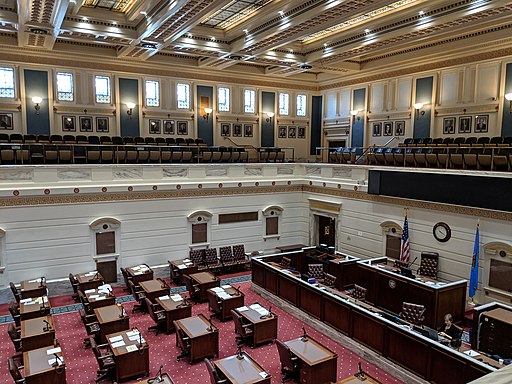The Oklahoma State Legislature adjourned its 2022 Regular Session on May 27 without referring any measures to the 2022 ballot for voters to consider.
During the 2021 and 2022 legislative sessions, the Legislature considered referring constitutional amendments and state statutes to the ballot. Fifteen constitutional amendments and one state statute had passed in the chamber of origin, but did not receive final approval in the opposite chamber before adjournment.
Proposed constitutional amendments must be referred to the ballot and receive voter approval to be enacted. To put a proposed constitutional amendment on a ballot, a simple majority vote of all members in both the Senate and House is required.
The Legislature can also refer state statutes to the ballot. Bills that raise revenue must pass in both the House and Senate with at least a three-fourths supermajority to be enacted without voter approval; if revenue increasing bills pass a simple majority but less than a three-fourths supermajority, they must be referred to the ballot.
Oklahoma also allows for citizen-initiated constitutional amendments, citizen-initiated state statutes, and veto referendums, making it one of 26 states in which statewide ballot measures can qualify for the ballot through a signature drive. The number of signatures required to qualify initiatives and veto referendums for the ballot is tied to the total votes cast for governor in the last gubernatorial election. For an initiated constitutional amendment, proponents must collect valid signatures equal to 15% of votes cast for governor — 177,958 for 2022. For initiated state statutes, the requirement is 8% — 94,911. For veto referendums, the requirement is 5% — 59,320.
Three measures concerning marijuana legalization and medical marijuana regulation have been cleared to collect signatures.
Two constitutional measures sponsored by Oklahomans for Responsible Cannabis Action (ORCA) were cleared for signature gathering on May 2, with signatures due by August 22, 2022. One of the measures, State Question 818, would create the State Cannabis Commission to replace the Oklahoma Medical Marijuana Authority and to regulate medical marijuana, cannabis, and hemp. The other measure, State Question 819, would legalize and regulate marijuana for persons 21 years old and older and would impose a 15% excise tax on marijuana sales for purchases by an individual without a medical marijuana license.
The other measure, State Question 820, is supported by New Approach PAC. The initiative would amend state law (rather than the state constitution) to legalize and regulate marijuana for persons 21 years old and older. The measure would also impose a 15% excise tax on marijuana purchases by individuals without a medical marijuana license. Under the measure, the Oklahoma Medical Marijuana Authority would be responsible for administering and regulating marijuana access. Signatures for the measure are due by August 1.
Medical marijuana was established in Oklahoma following voter approval of State Question 788, a statutory measure, in 2018. Under State Question 788, the Oklahoma State Department of Health was tasked with overseeing the medical marijuana program through the Oklahoma Medical Marijuana Authority. Following approval of the measure, lawsuits were filed alleging that the Authority was implementing the medical marijuana program in a way that did not align with provisions of the approved ballot measure.
Since State Question 788 was approved, the Legislature has passed and the governor has signed bills altering the state’s medical marijuana program and regulations. On May 11, 2022, Gov. Kevin Stitt (R) signed Senate Bill 1367, which increased penalties for sharing medical marijuana products with individuals who do not have medical marijuana licenses.
A total of 71 measures appeared on statewide ballots in Oklahoma from 2000 to 2020. Of the measures, 74.65% (53 of 71) were approved, and 25.35% (18 of 71) were defeated.


